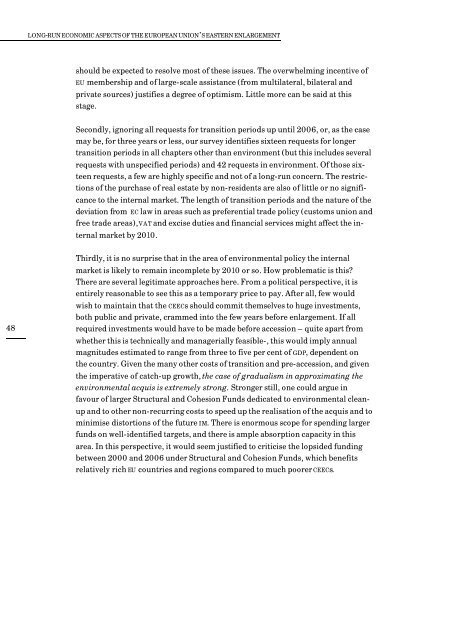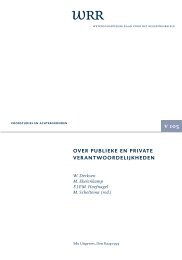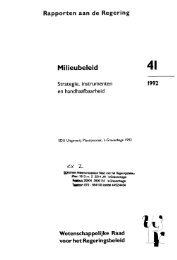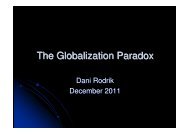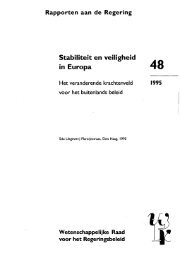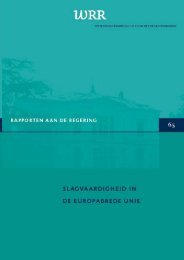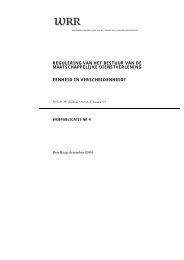w 109 long-run economic aspects of the european union's eastern ...
w 109 long-run economic aspects of the european union's eastern ...
w 109 long-run economic aspects of the european union's eastern ...
You also want an ePaper? Increase the reach of your titles
YUMPU automatically turns print PDFs into web optimized ePapers that Google loves.
LONG-RUN ECONOMIC ASPECTS OF THE EUROPEAN UNION’S EASTERN ENLARGEMENTshould be expected to resolve most <strong>of</strong> <strong>the</strong>se issues. The overwhelming incentive <strong>of</strong>EU membership and <strong>of</strong> large-scale assistance (from multilateral, bilateral andprivate sources) justifies a degree <strong>of</strong> optimism. Little more can be said at thisstage.Secondly, ignoring all requests for transition periods up until 2006, or, as <strong>the</strong> casemay be, for three years or less, our survey identifies sixteen requests for <strong>long</strong>ertransition periods in all chapters o<strong>the</strong>r than environment (but this includes severalrequests with unspecified periods) and 42 requests in environment. Of those sixteenrequests, a few are highly specific and not <strong>of</strong> a <strong>long</strong>-<strong>run</strong> concern. The restrictions<strong>of</strong> <strong>the</strong> purchase <strong>of</strong> real estate by non-residents are also <strong>of</strong> little or no significanceto <strong>the</strong> internal market. The length <strong>of</strong> transition periods and <strong>the</strong> nature <strong>of</strong> <strong>the</strong>deviation from EC law in areas such as preferential trade policy (customs union andfree trade areas), VAT and excise duties and financial services might affect <strong>the</strong> internalmarket by 2010.48Thirdly, it is no surprise that in <strong>the</strong> area <strong>of</strong> environmental policy <strong>the</strong> internalmarket is likely to remain incomplete by 2010 or so. How problematic is this?There are several legitimate approaches here. From a political perspective, it isentirely reasonable to see this as a temporary price to pay. After all, few wouldwish to maintain that <strong>the</strong> CEECs should commit <strong>the</strong>mselves to huge investments,both public and private, crammed into <strong>the</strong> few years before enlargement. If allrequired investments would have to be made before accession – quite apart fromwhe<strong>the</strong>r this is technically and managerially feasible-, this would imply annualmagnitudes estimated to range from three to five per cent <strong>of</strong> GDP, dependent on<strong>the</strong> country. Given <strong>the</strong> many o<strong>the</strong>r costs <strong>of</strong> transition and pre-accession, and given<strong>the</strong> imperative <strong>of</strong> catch-up growth, <strong>the</strong> case <strong>of</strong> gradualism in approximating <strong>the</strong>environmental acquis is extremely strong. Stronger still, one could argue infavour <strong>of</strong> larger Structural and Cohesion Funds dedicated to environmental cleanupand to o<strong>the</strong>r non-recurring costs to speed up <strong>the</strong> realisation <strong>of</strong> <strong>the</strong> acquis and tominimise distortions <strong>of</strong> <strong>the</strong> future IM. There is enormous scope for spending largerfunds on well-identified targets, and <strong>the</strong>re is ample absorption capacity in thisarea. In this perspective, it would seem justified to criticise <strong>the</strong> lopsided fundingbetween 2000 and 2006 under Structural and Cohesion Funds, which benefitsrelatively rich EU countries and regions compared to much poorer CEECs.


